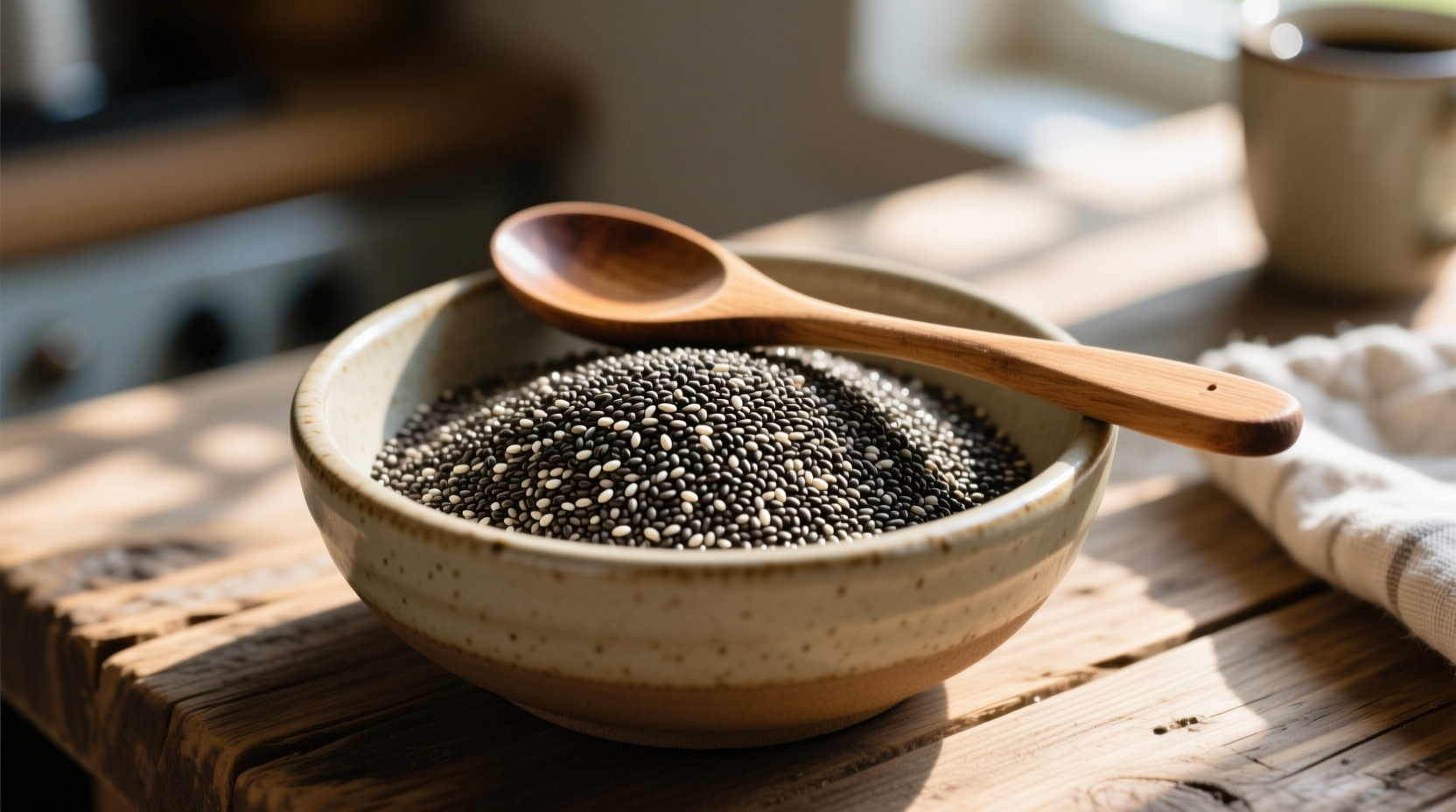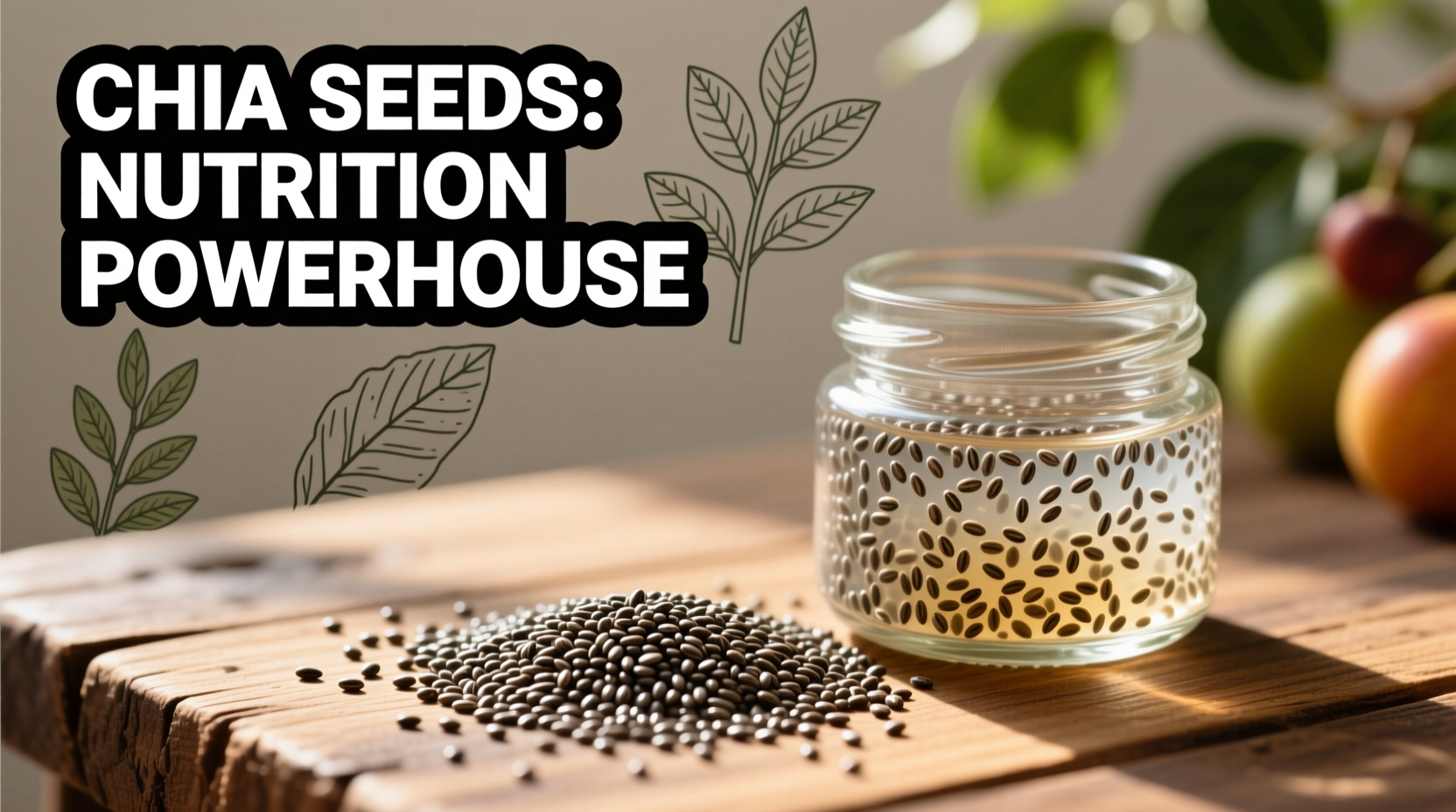Yes, chia seeds are generally good for you when consumed in appropriate amounts. These nutrient-dense seeds provide 10 grams of fiber, 5 grams of plant-based omega-3s, and 4 grams of protein per 28-gram serving. Research shows they support heart health, aid digestion, and help regulate blood sugar levels. However, some individuals may experience digestive discomfort, and those taking blood thinners should consult their physician before adding chia seeds to their diet.
As a nutrition powerhouse that's gained global popularity, chia seeds deserve more than just trendy superfood status. These tiny black and white seeds have been nourishing communities for centuries, but what does modern science actually say about their health impacts? Let's examine the evidence behind chia seeds' nutritional profile, proven benefits, and practical considerations for incorporating them into your daily routine.
What Exactly Are Chia Seeds?
Chia (Salvia hispanica) is a flowering plant native to central and southern Mexico and Guatemala. Ancient civilizations like the Aztecs and Mayans considered chia seeds so valuable they were used as currency and for endurance during long journeys. The word "chia" literally means "strength" in the ancient Mayan language.
After centuries of relative obscurity outside Latin America, chia seeds have experienced a remarkable resurgence as nutritional science validates many of their traditional uses. Unlike many modern "superfoods," chia's health benefits are supported by substantial research rather than marketing hype.
Chia Seeds Nutritional Powerhouse: By the Numbers
| Nutrient | Per 28g (2 Tbsp) | Daily Value % |
|---|---|---|
| Calories | 138 | 7% |
| Fiber | 10g | 38% |
| Omega-3 Fatty Acids | 5g | 312%* |
| Protein | 4.7g | 9% |
| Calcium | 177mg | 18% |
| Magnesium | 95mg | 23% |
*Based on 1.6g daily ALA omega-3 recommendation for adults (National Institutes of Health)
This impressive nutritional profile explains why chia seeds have become a staple in health-conscious kitchens worldwide. According to USDA FoodData Central, chia seeds contain more omega-3s per ounce than salmon, making them an exceptional plant-based source of these essential fatty acids.

Science-Backed Health Benefits of Chia Seeds
Heart Health Support
Multiple studies published in the Journal of Nutrition demonstrate chia seeds' positive impact on cardiovascular health. Their high omega-3 content helps reduce inflammation and may lower triglyceride levels. A 2012 clinical trial found that consuming 30 grams of chia seeds daily significantly reduced systolic blood pressure in people with hypertension.
The American Heart Association recognizes chia seeds as part of a heart-healthy diet due to their combination of fiber, healthy fats, and antioxidants. Unlike some trendy superfoods, chia seeds deliver these benefits without the caffeine or stimulants found in certain alternatives.
Digestive Wellness
With 10 grams of fiber per serving (more than double most other seeds), chia seeds excel at promoting digestive health. The soluble fiber forms a gel when mixed with liquid, which:
- Slows digestion for better nutrient absorption
- Feeds beneficial gut bacteria
- Helps prevent constipation
- Creates a feeling of fullness that supports healthy eating habits
Research from the University of Toronto shows that chia seeds' unique fiber composition helps maintain stable blood sugar levels by slowing the conversion of carbohydrates to sugar. This makes them particularly valuable for people managing type 2 diabetes.
Bone Strength Enhancement
Chia seeds provide 18% of your daily calcium needs in just two tablespoons—significantly more than most dairy alternatives. They also contain boron, a mineral essential for calcium metabolism and bone health. A study in the Journal of Medicinal Food found that regular chia consumption improved bone density markers in postmenopausal women.
When Chia Seeds Might Not Be Ideal: Context Boundaries
While generally beneficial, chia seeds aren't appropriate for everyone in all circumstances. Understanding these context boundaries ensures safe consumption:
- Swallowing whole seeds with insufficient liquid: Chia seeds expand up to 12 times their size when wet. Consuming dry seeds without adequate fluid can cause choking or esophageal blockage, particularly for those with swallowing difficulties.
- Blood thinning medication users: Due to their high omega-3 content, chia seeds may enhance the effects of blood-thinning medications like warfarin. Consult your physician before regular consumption.
- People with inflammatory bowel disease: During active flare-ups, the high fiber content may exacerbate symptoms. Introduce gradually during remission periods.
- Those with seed allergies: Though rare, some individuals experience allergic reactions to chia seeds.
Chia Seeds Research Timeline: From Ancient Remedy to Modern Science
Understanding the evolution of chia seed research reveals how traditional knowledge has been validated by contemporary science:
- 3500 BCE: Early cultivation by indigenous peoples in Mexico and Guatemala
- 1500s: Spanish colonists ban chia cultivation, nearly causing its extinction
- 1991: Modern research begins with Argentina's National Institute of Industrial Technology
- 2009: First major clinical trial published in Diabetes Care showing blood sugar benefits
- 2012: Landmark study in Nutrition Research demonstrates blood pressure reduction
- 2017: FDA approves chia seeds as GRAS (Generally Recognized As Safe)
- 2020: Comprehensive review in Nutrients confirms multiple health benefits with minimal risks
Practical Ways to Enjoy Chia Seeds Daily
Unlike some health foods that require complicated preparation, chia seeds offer remarkable versatility. Here's how to incorporate them effectively:
Simple Incorporation Methods
- Chia pudding: Mix 3 tablespoons chia seeds with 1 cup milk (dairy or plant-based). Refrigerate for 3+ hours. Top with fruit and nuts.
- Smoothie booster: Add 1-2 tablespoons to your favorite smoothie for extra fiber and omega-3s without altering flavor.
- Egg substitute: Mix 1 tablespoon chia seeds with 3 tablespoons water to replace one egg in baking.
- Hydration enhancer: Stir into water or juice for a refreshing, nutrient-dense beverage (chia fresca).
Avoiding Common Mistakes
- Don't consume dry: Always soak or mix with liquid to prevent potential choking hazards
- Start small: Begin with 1 tablespoon daily, gradually increasing to avoid digestive discomfort
- Store properly: Keep in an airtight container in the refrigerator to prevent rancidity
- Balance intake: Two tablespoons daily provides optimal benefits without excessive calorie intake
Debunking Common Chia Seed Myths
Let's address some persistent misconceptions about these nutritional powerhouses:
- Myth: Chia seeds alone cause significant weight loss
Reality: While chia seeds promote satiety and may support weight management as part of a balanced diet, no single food causes substantial weight loss without overall dietary changes. - Myth: All chia seeds are nutritionally identical
Reality: Black chia seeds typically contain slightly more omega-3s, while white varieties have marginally more calcium. Both offer excellent nutrition. - Myth: You must grind chia seeds for absorption
Reality: Unlike flaxseeds, chia seeds don't require grinding—your body can fully access their nutrients in whole form.
Your Chia Seed Journey: Next Steps
Now that you understand chia seeds' benefits and proper usage, consider these practical next steps:
- Start with one tablespoon daily mixed into yogurt or oatmeal
- Experiment with chia pudding using your favorite milk and flavorings
- Track how your body responds over 2-3 weeks
- Gradually increase to the recommended two tablespoons if well-tolerated
- Consult a registered dietitian if you have specific health conditions
Remember that chia seeds work best as part of a varied, balanced diet—not as a magic solution. Their true value comes from consistent, moderate incorporation into your daily eating pattern.











 浙公网安备
33010002000092号
浙公网安备
33010002000092号 浙B2-20120091-4
浙B2-20120091-4